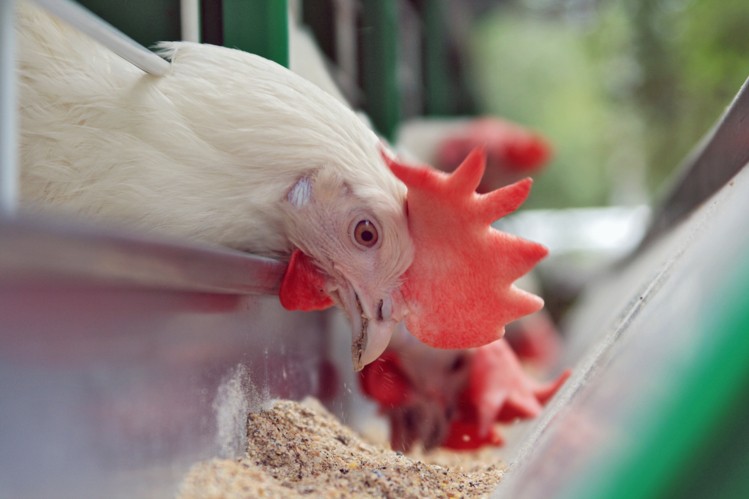Tannic acid may reduce footpad dermatitis in poultry

An international team of researchers from the US and Turkey examined the use of tannic acid supplements in feed on growth performance and footpad dermatitis (FPD) in broiler chickens. The researchers published their work in the journal of Livestock Science. We hypothesized that low levels of dietary tannic acid may actually improve the litter quality to reduce the incidence and severity of FPD by lowering the viscosity of digesta and optimizing the intestinal environment in broiler chickens fed barley-based diets, the researchers said. The objective of the present study was to evaluate the preventive effect of tannic acid against FPD in broiler chickens fed diets based on barley. The group found that adding barley to the diets of chickens exacerbated the severity of FPD and reduced body weight grain and feed intake, the researchers said. However, use of supplemental tannic acid in the feed limited occurrence and severity of FPD results. Further research is needed to understand the mechanism of FPD prevention effect of tannic acid,they said. The supplementation of tannic acid in commercial broiler flocks may present the true picture of the preventive effects of tannic acid against FPD.
Why tannic acid?
Footpad dermatitis is a disease that sees the formation of necrotic lesions on the plantar surface of turkey and chicken feet, said the researchers. It can reduce health and productivity in broiler chickens, and limit quality of chicken feet as a human food item causing economic losses. The major cause of the disease is litter quality, or wet litter, they said. However, diet composition is a diverse risk. In diet considerations, soybean meal has been examined because it carries non-starch polysaccharides (NSP), they said. Indigestible carbohydrates like NSP in plant-based protein sources may play a role in the development of FPD in broiler chickens. But, several other feed ingredients are also thought to play a role, they said. The concentration of soluble NSP in grains like wheat, barley and other grains is high when compared to soybean meal, they said. But high dietary NSP levels can increase the viscosity of intestinal contents meaning birds produce stickier fecal matter and prolonged adhesion of fecal material is likely to irritate and damage the epidermis and keratin layers on the feet. There is potential that the NSP in barley may induce FPD in broiler chickens, but the dietary levels at which this could happen are unknown, said the researchers. Previous feeding trials did not see development of the disease when 25% of the diet was hulled barley, so a 30% inclusion rate was used. Different methods have been used to prevent or treat FPD in broiler chickens and turkeys, they said. Use of enzymes and altering levels of sodium, biotin, zinc and methionine have been tried. However, those methods have been unable to fully prevent or ameliorate the disease and alternative solutions are needed, they said. Tannins also have been found to be an anti-nutritional substance that limit digestion and cause reduced growth performance, they said. Although, the safe levels of tannic acid for broiler chickens are unclear, tannic acid also is through to be a potential antimicrobial growth promoter when used as a feed additive for disease control and could potentially to improve growth performance, fecal consistency and litter quality.
Methods and materials
In the study, 544 male broiler chickens were given one of several trial diets for a period of 42 days, said the researchers. The diets included a corn-soybean meal diet or a diet with 30% barley and either 0 or 2g/kg tannic acid.Bird feed intake and body weight (BW) gain were noted, and the feed conversion ratio (FCR) was calculated, they said. Sample birds were collected for assessment of the viscosity of intestinal contents on days 14, 28 and 42.Litter quality was assessed for pH and moisture at the start and end of the trial and it was checked for ammonia volatilization on day 28 and 42, they said. Incidence and severity of FPD were noted on days 14, 28 and 42 using a visual scoring system.
Results
No interaction was found between the tannic acid supplement and the diet used, said the researchers. But, barley inclusion reduced body weight and feed intake.
The barley diet also increased the viscosity of contents in the posterior segment of the intestinal tract, they said. And it increased the rate and severity of FPD lesions found on days 14, 28 and 42. Supplemental tannic acid did not alter bird performance, intestinal viscosity or litter quality, but it did tend to reduce body weight gain, increase the feed conversion ratio and ammonia volatilization, they said. However, it also prevented FPD lesion development and reduced the overall amount of FDP lesions found at the end of the feeding trial, they said. Barley-based diets may worsen the growth performance and litter quality, and increase the intestinal viscosity that increases the incidence and severity of FPD in broiler chickens, the researchers said. Dietary tannic acid supplementation may not affect the growth performance, intestinal viscosity, and litter quality. However, it may reduce the incidence and severity of FPD in broiler chickens.
Source: Livestock Science